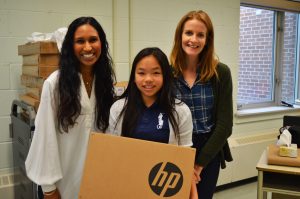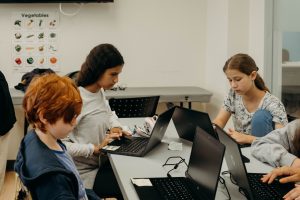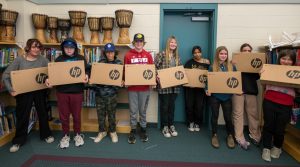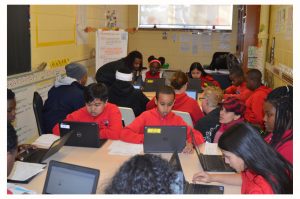Feeling left out – at this or any time or year – is often worse than a feeling; it can be an economic impediment to personal and professional development.
Technology – or the lack of it – can exacerbate those feelings of exclusion.
Especially for young people today, not having the right (not having any) smartphone, Internet connection, computer or other digital device is a kind of technology poverty: it reduces access to information and education, and that limits income potential. The wrong technology, or the inexperienced use of it, can compromise personal safety online. Even social anxieties and mental health issues can be aggravated by a lack of suitable technology and sufficient infrastructure.
The pandemic made all-too-clear how vital technology and connectivity are, and it revealed just how many of us across North America lack reliable computer access, such as is needed for online education.
But years before COVID, a registered Canadian charity took on the need to equip young individuals in under-resourced and under-served communities with the technology tools they need to thrive: it began to provide a brand-new laptop, Internet access, and the essential digital skills training to students across Canada.
With its 20th anniversary celebrations coming up, ComKids has now supported more than 110 schools across the country and welcomed some 9,000 Grade 7 and 8 students to its program.

(L to R) Leah Ali, a ComKids student, and a TCDSB Educator at a ComKids event.
As Leah Ali, Executive Director at ComKids, explains it, “We’re all becoming more and more tech dependant in our lives, and those who do not have consistent access to technology are severely disadvantaged. So we do work with those who are facing ‘digital exclusion’. Our goal is to digitally empower all Canadian youth so they can reach their potential in school and have the same opportunities as everyone else.”
She describes the “three pillars” that empower the digital generation: connectivity, hardware, and learning opportunities.
ComKids works with major school boards across the country to identify those schools and students most in need, and it prioritizes communities facing the highest levels of inequity and where digital access is most needed. The digital divide has been shown to disproportionately affect low-income, rural, and BIPOC communities, but not exclusively, so it is difficult for these youth to keep up with their peers socially, economically, and academically.

Students learn about online safety and maintaining a safe digital footprint; computer literacy, computer tools and how to use them as part of the ComKids program.
As Ali points out, the digital divide does not just separate those without any technology, it can leave people feeling left out even when technology is available, but access time is scarce. When a home computer or Internet connection must be shared with siblings, with Mom and Dad, with Auntie and Uncle, then there is still a challenge that must be navigated.
ComKids provides a needs assessment questionnaire to teachers, students, and parents of those who apply, asking about home set-ups and describing the program expectations. Once enrolled, ComKids provides each kid (eligible in Grade 7 or 8) with a new HP laptop or Chromebook, good Internet connectivity, and digital literacy/online safety training, delivered in conjunction with participating police services and other education partners.
Covered topics can include online safety and maintaining a safe digital footprint; computer literacy, computer tools and how to use them; as well as the importance of becoming educated citizens in a digital world, and being a responsible person online.
HP is the official technology partner of the non-profit ComKids; for each year’s program, HP provides a new laptop with a three-year warranty to the accepted students.
Near the end of their participation, the students hand in a creative assignment they develop themselves using their new computer and showing the digital confidence they are developing with it.

HP is the official technology partner of the non-profit ComKids; the company provides a new laptop with a three-year warranty to the accepted students.
“This program not only gave me the tools but also the courage to pursue my education,” says Tina Davoudbeiglou, a ComKids alumni and now a registered nurse.
Reached while travelling home to Toronto from a nursing assignment in New Brunswick, she described how, thanks to ComKids, she “transformed from being limited by technology to having the confidence to excel in today’s tech-driven world.”
“Yes, I did feel left out because of technology,” she recalls. The child of a single mom and student, she remembers having ring tone for shared fax and Internet: “It was horrendous!”
But once she was accepted into the program, it was “like my life started. It was an amazing experience, and I had no idea how much it would help later on with my confidence. It helped me reach where I am today. My heart breaks for those who do not have the technology. In this day and age, you need it to have the confidence to pursue your dreams.”
With the program’s 20th anniversary (known as ComKids today, it was once Kids, Cops and Computers, and is the signature program of the Merry Go Round Children’s Foundation) approaching in 2024, the organization is reflecting on its past successes and its future opportunities, and also the vital role played by its partners and supporters, Ali says.
The ComKids 20th Anniversary Sports Mixer fundraiser will be held at the Hockey Hall of Fame in Toronto next April.
“It’s a really big deal,” Ali enthused. “A beautiful event every year, but more so in this, a year of reflection and celebration. It’s a big ‘thank you’ to all our donors, and it’s a chance for them to meet some of our program participants. Two students will speak at the event, and share their experiences, and we will all celebrate the accomplishments so far as we look forward to those in the next 20.”

The digital divide has been shown to disproportionately affect low-income, rural, and BIPOC communities, but not exclusively. The impacts can be social, economical, and academic.



